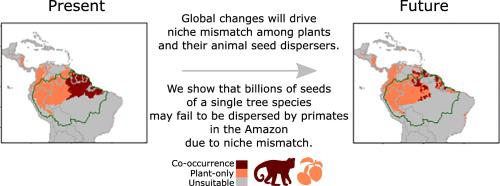当前位置:
X-MOL 学术
›
Biol. Conserv.
›
论文详情
Our official English website, www.x-mol.net, welcomes your feedback! (Note: you will need to create a separate account there.)
Climate niche mismatch and the collapse of primate seed dispersal services in the Amazon
Biological Conservation ( IF 5.9 ) Pub Date : 2020-07-01 , DOI: 10.1016/j.biocon.2020.108628 Lilian Sales , Laurence Culot , Mathias M. Pires
Biological Conservation ( IF 5.9 ) Pub Date : 2020-07-01 , DOI: 10.1016/j.biocon.2020.108628 Lilian Sales , Laurence Culot , Mathias M. Pires

|
Abstract Animal-plant interactions are threatened by ongoing climate change, deforestation, and defaunation. The disruption of biotic interactions leads to loss of ecosystem services but estimates of the magnitude of reductions are rarely available. Using a seed disperser primate community in the Amazon as study case, we forecast the magnitude of seed dispersal services to be lost as function of the future redistribution of species. In the most likely scenario, our projections indicate average contractions of 56% (23 to 100% reduction) on the suitable areas for the studied primates. As result, we found billions of seeds of a model tree (Manilkara bidentata) might fail to be dispersed by this primate community on each fruiting season. Primate contribution to seed dispersal was, however, uneven among species, highlighting the endangered large-bodied woolly monkey Lagothrix cana as a keystone disperser. That species alone was responsible for about 64% of all Manilkara seeds dispersed in the present and up to 71% in the future. Niche mismatch will, however, lead to 37% of the future plant distribution not being able to host its second top disperser (the tufted capuchin Sapajus apella), exacerbating losses on potential seed dispersal. Our projections indicate that seed dispersal in tropical forests might be hampered by global changes, even if defaunation by poaching is controlled. The forecasted magnitude of loss in seed dispersal services is alarming and may have been overlooked in conservation assessments. In a similar manner, niche mismatch and disruption of biotic interactions will likely impair ecosystems functions and resilience worldwide.
中文翻译:

亚马逊地区气候生态位不匹配和灵长类动物种子传播服务的崩溃
摘要 动植物相互作用受到持续的气候变化、森林砍伐和动物区系丧失的威胁。生物相互作用的破坏会导致生态系统服务的丧失,但几乎无法估计减少的幅度。使用亚马逊的种子传播者灵长类动物群落作为研究案例,我们预测种子传播服务的损失程度作为未来物种再分配的函数。在最有可能的情况下,我们的预测表明,研究灵长类动物的合适区域平均收缩 56%(减少 23% 至 100%)。结果,我们发现模型树 (Manilkara bidentata) 的数十亿颗种子可能无法在每个结果季节被这个灵长类动物群落散播。然而,灵长类对种子传播的贡献在物种之间是不均衡的,突出显示濒临灭绝的大型长毛猴 Lagothrix cana 作为基石分散剂。仅该物种就占目前分散的所有 Manilkara 种子的 64% 和未来高达 71% 的原因。然而,利基不匹配将导致 37% 的未来植物分布无法容纳其第二个顶级传播者(簇绒卷尾猴 Sapajus apella),从而加剧潜在种子传播的损失。我们的预测表明,即使偷猎造成的动物区系丧失得到控制,热带森林中的种子传播也可能受到全球变化的阻碍。种子传播服务的预测损失程度令人震惊,可能在保护评估中被忽视。以类似的方式,生态位错配和生物相互作用的破坏可能会损害全球生态系统的功能和恢复力。
更新日期:2020-07-01
中文翻译:

亚马逊地区气候生态位不匹配和灵长类动物种子传播服务的崩溃
摘要 动植物相互作用受到持续的气候变化、森林砍伐和动物区系丧失的威胁。生物相互作用的破坏会导致生态系统服务的丧失,但几乎无法估计减少的幅度。使用亚马逊的种子传播者灵长类动物群落作为研究案例,我们预测种子传播服务的损失程度作为未来物种再分配的函数。在最有可能的情况下,我们的预测表明,研究灵长类动物的合适区域平均收缩 56%(减少 23% 至 100%)。结果,我们发现模型树 (Manilkara bidentata) 的数十亿颗种子可能无法在每个结果季节被这个灵长类动物群落散播。然而,灵长类对种子传播的贡献在物种之间是不均衡的,突出显示濒临灭绝的大型长毛猴 Lagothrix cana 作为基石分散剂。仅该物种就占目前分散的所有 Manilkara 种子的 64% 和未来高达 71% 的原因。然而,利基不匹配将导致 37% 的未来植物分布无法容纳其第二个顶级传播者(簇绒卷尾猴 Sapajus apella),从而加剧潜在种子传播的损失。我们的预测表明,即使偷猎造成的动物区系丧失得到控制,热带森林中的种子传播也可能受到全球变化的阻碍。种子传播服务的预测损失程度令人震惊,可能在保护评估中被忽视。以类似的方式,生态位错配和生物相互作用的破坏可能会损害全球生态系统的功能和恢复力。



























 京公网安备 11010802027423号
京公网安备 11010802027423号